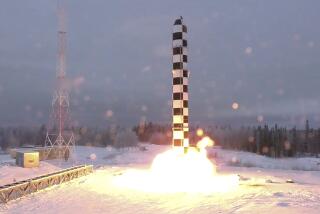Nuclear Test Plan to Get Further Review : Defense: Pentagon proposed allowing blasts to check safety, reliability of older weapons.
- Share via
WASHINGTON — After political outcry by arms-control advocates, the Clinton Administration has tabled a proposal by senior defense officials seeking to conduct small-scale nuclear blasts under a future test ban treaty.
The White House canceled a meeting at which senior military leaders, Cabinet secretaries and National Security Council officials were to have thrashed out a policy on whether such nuclear tests should be permitted under the treaty.
National Security Adviser Anthony Lake sent the issue back to lower-level officials with instructions to conduct further analysis that could take months--a clear setback to defense officials who had hoped the issue would be quietly resolved in their favor.
Senior defense officials have asserted that the United States should get permission under the future comprehensive test ban treaty, now being negotiated in Geneva, to conduct nuclear explosions equivalent to as much as 500 tons of high explosives.
Pentagon officials have argued that a permanent ban on all nuclear tests would eventually lead to uncertainty about the reliability and safety of thousands of aged nuclear weapons that the United States will retain. By the time the treaty takes effect, some bombs will be 20 years old.
But Energy Secretary Hazel O’Leary, whose department has responsibility for maintaining the weapons, has sharply disputed the need for such tests and said computer models are capable of maintaining high confidence in nuclear bombs. The State Department and the Arms Control and Disarmament Agency also are sharply opposed to the tests.
One Pentagon foe said Lake’s decision was based on the conclusion that the Pentagon carried the burden of proving the tests are necessary and that so far it had failed to state a case. But several other Administration sources insisted that Lake has made no decision against the Pentagon proposal and that the delay reflects an unwillingness by the White House to blunder into a political minefield without a better understanding of the issue.
The Pentagon’s proposal, which first became public late last week, has triggered an outcry by arms-control organizations and within Congress. A letter signed by nearly two dozen Senate Democrats raised serious objections and urged the White House to reject the proposal.
The nuclear testing issue has surfaced at an inopportune time for the Administration, coming on the heels of a decision by France to resume full-scale underground nuclear testing until the comprehensive test ban takes effect.
*
U.S. officials do not intend to follow France. Nonetheless, when the Pentagon proposal was disclosed, a number of foreign diplomats registered complaints.
“The stakes are very high,” said the Administration official. “
Indeed, the Jasons, a group of influential physicists who provide guidance on nuclear weapons issues, have not yet submitted the results of a study of the need for the testing, said Sidney Drell of the Stanford Linear Accelerator.
More to Read
Sign up for Essential California
The most important California stories and recommendations in your inbox every morning.
You may occasionally receive promotional content from the Los Angeles Times.











